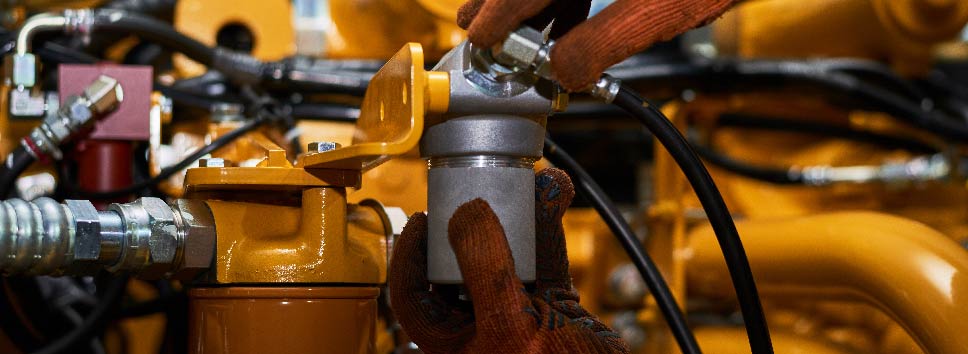When it comes to hydraulics, you’re not just buying lubricants, you’re buying reliability. Purchasing the right lubricant will optimize drain intervals, control maintenance costs, minimize downtime, maximize profitability, and enhance performance.
Hydraulic systems are complex and often face many challenges. Here are some typical challenges you may see and the common causes behind them.
| Typical Challenges | Common Cause |
| Poor hydraulic performance, premature component failure and unexpected downtime. | The hydraulic fluid is not clean enough to meet the demands and application of the hydraulic system. Many newer hydraulic systems use piston pumps, include smaller reservoirs, and have tighter tolerances (i.e. servo valves) to generate higher pressures, improving efficiencies. These types of systems require cleaner fluids.
|
| Controlling and managing oil contamination (solid, water, etc) contributing to increased wear, poor hydraulic performance, and premature component failure. | Improper product storage and handling procedures as well as contamination entering through faulty seals and leaking cylinders.
|
| Increase downtime and higher maintenance costs as a result of shorter drain intervals. | As a result of smaller reservoirs and higher pressures to generate more work with improved efficiencies, operating temperatures are higher, contributing to increased oil oxidation, sludge/deposits and shorter oil life.
|
| Reduced hydraulic oil performance, resulting in more frequent oil changes and/or premature component failures. | Mandated use of biodegradable/zinc free hydraulic fluids (i.e. rape seed oils) which in some cases offer reduced oxidation and antiwear performance and lower VI, for environmentally sensitive applications.
|
| More frequent and higher cost pump repairs/replacement. | Higher pressure systems require piston pumps, which are more costly and less tolerant to dirt and contamination compared to lower pressure gear pumps.
|
| Inadequate lubrication to critical components contributing to premature failures. | Cavitation. Commonly detected if inlet oil is hotter than normal, unusual operating noise, pump delivers low or erratic pressure and/or excessive pump wear.
|
| Inadequate lubrication to critical components contributing to premature failures. | Aeration. Commonly detected if air bubbles present in fluid stream, pump makes a whining sound, low fluid levels, return line above fluid level and/or air leak inlet side of pump.
|
| Premature corrosive wear to component. | The hydraulic fluid has inadequate rust and corrosion protection, high levels of water contamination have caused irreversible damage to the additive package and/or the fluid is at its useful life. |
After reviewing these typical challenges, its important to consider these important factors when selecting the proper hydraulic fluid:
- OEM recommendations
- Type of pump (gear, vane, piston) and controls (servo valves, proportional valves, etc)
- Type of application: Industrial – <500 ppm Zinc (AW), Mobile – >1000 ppm Zinc (AW)
- Ambient and operating system temperatures – Optimum operating temperature is 120°
- Current lubricant in use and how it is performing (review used oil analysis for trending).
- Environmental impact: Use of inherently biodegradable fluids meeting the LC-50 specification.
You should always ensure the ISO viscosity grade selected meets the OEM minimum fluid viscosity requirements at the highest operating temperature. Other variables which can impact actual performance results include: operator performance, idle time, actual load variations, changes in operating or environmental conditions, maintenance practices, filter quality and cleanliness levels and other products used.
We offer Chevron branded premium hydraulic oils, including Rando HD, Rando HDZ and Clarity Synthetic. These top-of-the-line products are perfect for manufacturing, injection molding, inland marine, mining, construction, agriculture and other industries that require hydraulic systems. As your Chevron Lubricants Supplier, for more information or for help selecting the right hydraulic oil for the job, contact us today!
